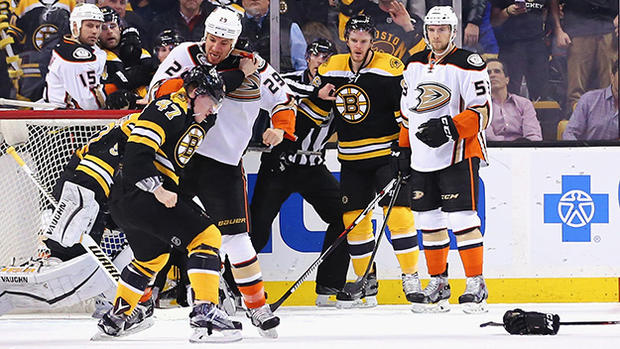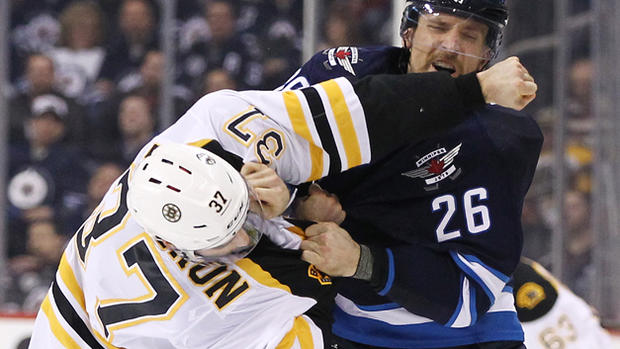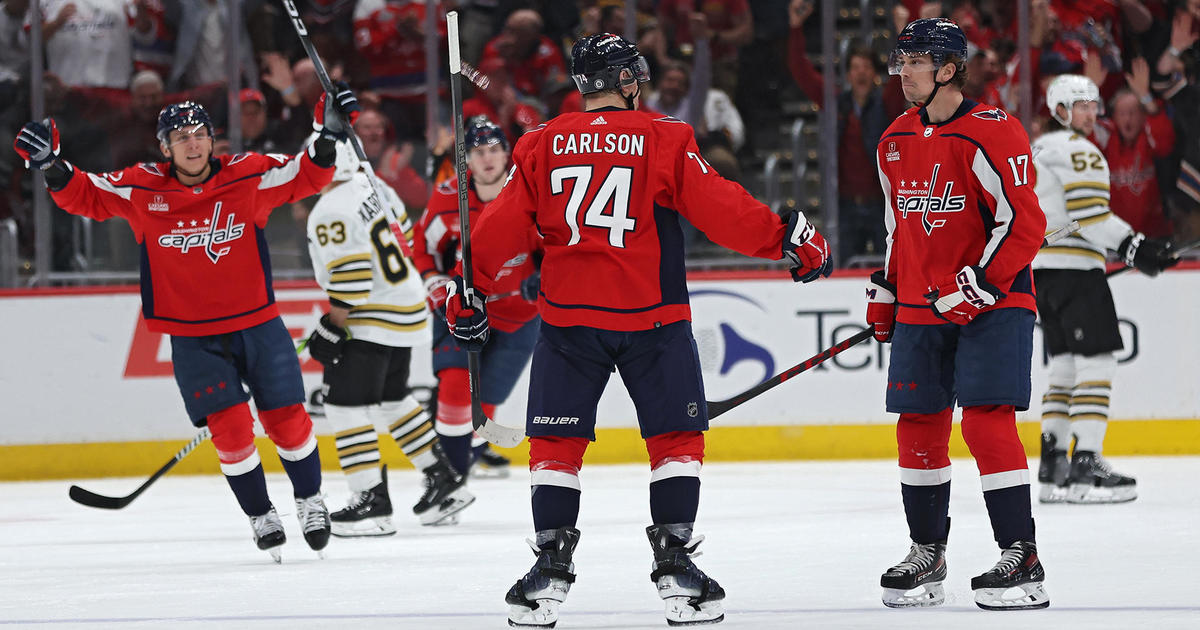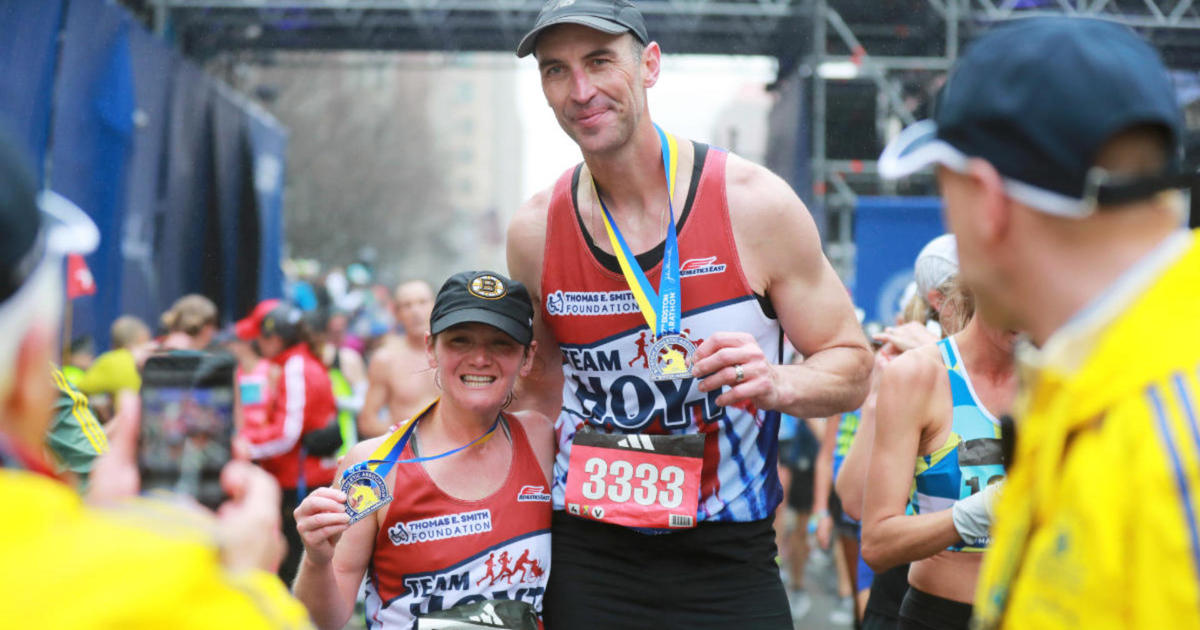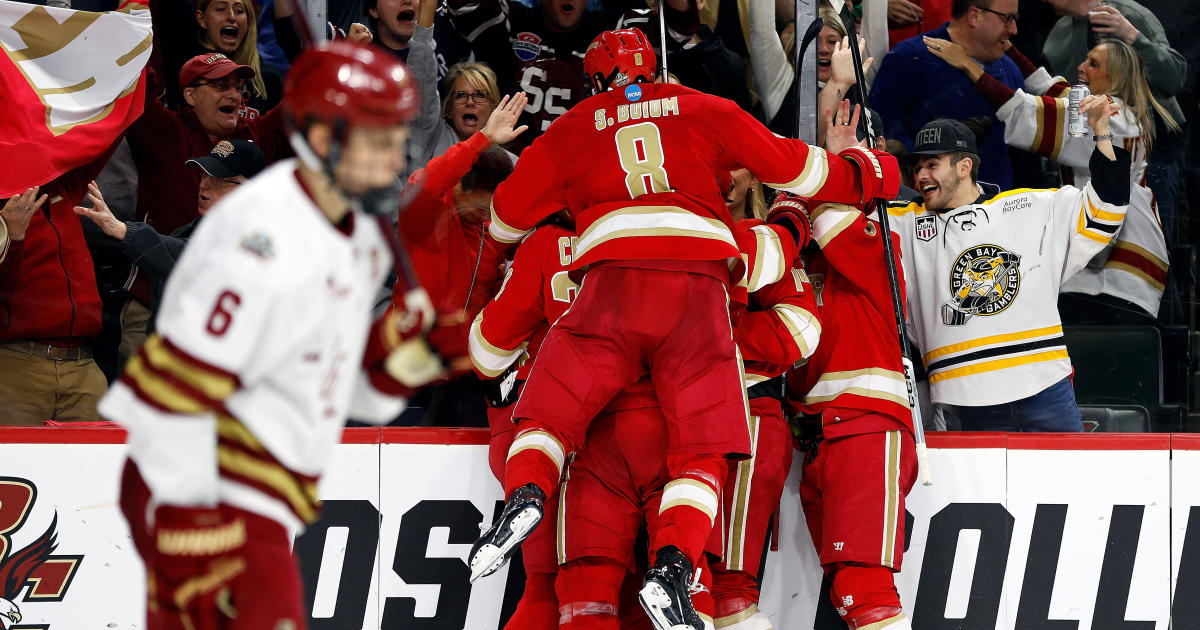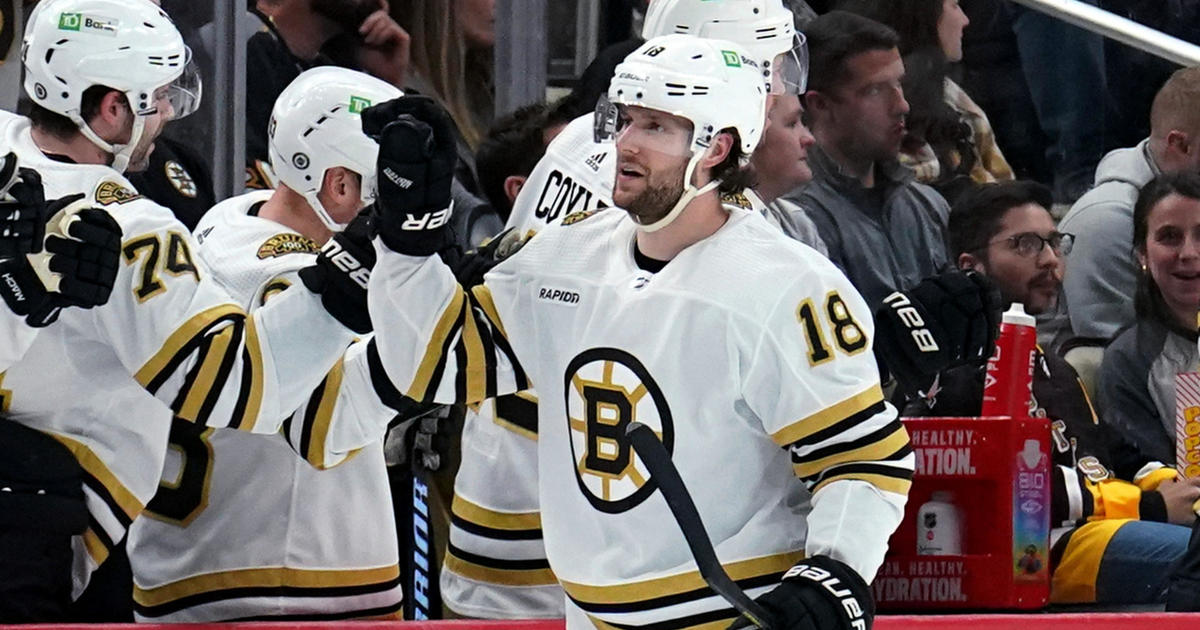NHL Referees Have Declared War On Fighting, And It's Making The Game More Dangerous
By Matt Dolloff, CBS Boston
BOSTON (CBS) -- Fighting in the NHL is one of the most controversial player safety topics in sports, and it's not impervious to criticism. It's sometimes gratuitous, often dangerous, and always violent. But it's also been ingrained in the culture of professional hockey for over a decade, to the point where it is simply a byproduct of players' animalistic instincts taking over. Despite a steep drop-off in fighting majors in recent seasons, eliminating it entirely is a much bigger, more complicated challenge.
Emotions tend to run high in testosterone-fueled NHL games, especially if it's an important game between division rivals. The Boston Bruins and Buffalo Sabres had one such contest on Thursday night. While the Bruins came back to win with two goals in a relatively clean third period, the first two frames were markedly stained by pervasive efforts on the part of the officials to ensure that no actual fights took place.
The refs, and the league, are declaring war on fighting. And it doesn't appear that it's what the players themselves want.
That sentiment did not stop the officials from rushing to break up a fight on Thursday night in Buffalo between two willing combatants - in this case, the Bruins' Adam McQuaid and the Sabres' William Carrier. The latter had previously delivered a borderline dirty hit near the head area of the Bruins' David Backes that caused an upper-body injury, which is suspected to be a concussion. Backes is day-to-day and Carrier will not receive any supplemental discipline for the hit.
Still, McQuaid felt it was necessary to drop the gloves in retaliation for Carrier's hit, which has long been a standard reaction to such plays. It's debatable whether or not you felt Carrier's hit was deserving of a retaliatory bout, but the plain truth is that in this particular situation, both men were willing to sort things out with each other.
Instead, linesmen Mark Shewchyk and Greg Devorski jumped in and grabbed each player, one of them holding down McQuaid's arm. This left the Bruins defenseman unable to defend himself as Carrier pummeled him in the head with a free hand. Incredibly, it would have been more beneficial for each player's safety if the officials simply let them fight it out. Instead, McQuaid got hit with a two-minute instigator penalty on top of the fighting major.
Technically, McQuaid deserved the instigator penalty - but in basically being held against his will to take several clean shots to his face, the penalty ceased to be fair officiating and became insult-to-injury.
The refs would go on to break up a couple more potential fights, which only escalated the matter further. The teams clearly wanted to get a fight out of their system, because it's been their instinct for many of their entire careers. The hooks, slashes, and trips increased. The tension was palpable.
Things eventually calmed down, especially in the third period, but the damage had been done. Backes was out with an upper-body injury, McQuaid had served his penalty and gotten his stitches, and even Carrier had to leave the game with a hand injury.
Much of this trouble could have been prevented if the refs simply let the original McQuaid-Carrier fight take place.
Michael Hurley posted a column on Wednesday after the Bruins' loss to the Columbus Blue Jackets, in which the refs quickly broke up an ensuing fight between McQuaid and the Jackets' Josh Anderson. That example was questionable enough, but Thursday night's behavior by the officials was inexcusable. Not surprisingly, everyone on the NESN broadcast - from announcers Jack Edwards and Andy Brickley to studio hosts Billy Jaffe and Barry Pederson - lambasted the refs for not getting out of the way and letting the players sort it out themselves.
The officials' decisions in the McQuaid-Carrier incident only made the situation worse. Fighting has obvious risks involved with head injuries, but the way the refs went about it here did nothing to necessarily prevent that. To officiate this way with two grown men who are both willing to fight is not just potentially dangerous (and, therefore, counterproductive) to their safety, it's insulting and patronizing. It's a denial of the players' own mutual desires.
Although support for stricter enforcement and a reduction in fighting has grown among NHL players, the latest data still overwhelmingly opposes an outright ban. A 2012 NHLPA players poll showed that 98 percent of players who were polled voted against a ban on fighting. A 2013 story on CBC quoted many current (at the time) and former NHL players arguing that the "fear of getting beat up," as the legendary Bobby Orr put it, made the game safer, and a fighting ban would simply lead to more cheap shots and chippy play that could cause needless injuries. In fact, you saw an example of that phenomenon during Bruins-Sabres last night.
There are plenty of common sense arguments as to why fighting either no longer has a place in the NHL, or should at least see a significantly reduced role in the game - which it already has. Enforcers are a relic of the NHL's past after the league responded to a string of tragic deaths involving former fighters who were discovered to have CTE. In an NHL era that emphasizes speed and skill and has unprecedented knowledge and awareness of the dangers of head trauma, there is not an inherent need for teams to employ players whose sole purpose is to fight.
However, to call for an outright ban on fighting - or to go out of your way to keep fights from happening while players still find it necessary at times - is to take your anti-fighting measures too far, too quickly. It's to aggressively extinguish an aspect of the game that was unquestioned for decades, that was part of the way players learned to police themselves on the ice.
To take that instinct away from a league of players that has been passed down through generations is just not as simple as breaking it up when two guys drop the gloves. McQuaid and Carrier's reactions were visceral and instinctual, and not the kind of behavior that can be curbed or prevented by doing what the linesmen did on Thursday.
Not only do tactics like those of the refs on Thursday night put players in unintended danger, it empowers those who wish to denigrate longtime fans of the game who are entertained by the occasional fight or understand its still-somewhat-necessary place in the game. Take this column by Puck Daddy's Ryan Lambert, a prominent hockey blogger for Yahoo! Sports who has long become notorious for challenging the NHL's long-held ideals and aggressively pushing analytics-driven narratives that eschew history and tradition. His confrontational and, sometimes, contrarian writing style is often off-putting to die-hard hockey fans.
On the surface, that's fine. It's OK to challenge conventional wisdom. But sometimes, Lambert gets to the point of disparaging his own readers, like he did with this abhorrent passage:
And look, if you like fighting in hockey, that doesn't necessarily make you a bad person (though obviously it doesn't help). It does make you a low-brow creep who doesn't understand they can just watch UFC fights and get more of what they're ostensibly looking for, but also it just makes you a product of how you grew up.
Well, then, I guess 98 percent of the players we love to watch and cover are all low-brow creeps. Insults like these make you wonder why writers like Lambert even watch hockey, or how they could possibly enjoy such a barbaric contest. Believe it or not, it's possible to recognize the value of fighting without being a bloodthirsty neanderthal. It's possible to see why it would have actually been safer to simply let McQuaid and Carrier fight it out while also understanding the risks involved with fighting and the benefits to reducing it.
This is not to say that you're weak if you staunchly oppose fighting. The medical risks are real and there are noble reasons why a reduction in fighting and eradication of unnecessary components like goons or staged fights would be good for players' long-term health - and not necessarily detrimental to the health of the game itself. Lambert's column includes a graph detailing how a drop-off in fighting has not had a considerable impact on TV ratings, a trend that owners and networks will certainly want to strongly examine.
However, fighting majors have dropped off dramatically since that players poll, yet there is still no ban and there are still players who are willing to drop the gloves, if only to stick up for an injured teammate. And another graph in Lambert's column is presented to argue that fighting does not actually limit cheap shots, but there's an inherent fallacy in the graph that defines cheap shots as plays that result in penalties. It's much, much more complicated than that.
Fighting still has a place in the game, whether the league and writers like Lambert like it or not. Maybe fighting is on its way to extinction. The league is certainly changing dramatically. But the fact that it still hasn't been banned is a sign that the majority of the league's owners still see its value as not just entertainment but as a way for the players to keep each other in line. Even Carrier would agree with that.
To do what the referees did to McQuaid and Carrier on Thursday night is not the way to legislate fighting out of the game. In fact, it only made the game more dangerous.
Matt Dolloff is a writer for CBSBostonSports.com. Any opinions expressed do not necessarily reflect that of CBS or 98.5 The Sports Hub. Have a news tip or comment for Matt? Follow him on Twitter @mattdolloff and email him at mdolloff@985thesportshub.com.
